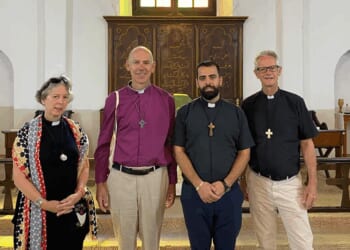NEW WINE has apologised to an assistant curate who encountered racism, homophobia, and conversion therapy while taking part in an internship at one of its churches in 2013 and 2014.
In a statement last week, New Wine said that the church where the Revd Dr Augustine Tanner-Ihm had spent a “Discipleship Year” placement had “conducted its own investigation and made a full apology to him”.
It also made its own apology: “We are deeply sorry for what he experienced during that time, for the failures in our systems, governance and culture that allowed it to happen, and for the ways in which we failed to respond adequately to his disclosure in the years that followed. New Wine also acknowledge that part of what Augustine experienced was shaped by unconscious bias and racial prejudice.”
The statement said that it had failed to conduct a “sufficiently robust vetting process” of the church involved, and that both the complaints system and its response to Dr Tanner-Ihm’s disclosures over nearly a decade had been “inadequate. We did not listen well, and we did not act.”
In the wake of an independent lessons-learned review, New Wine had, the statement said, made “substantial changes over the last two years”, including strengthening safeguarding policies and processes, improving procedures for selecting Discipleship Year placement churches, and enhancing practices for safer recruitment into leadership roles.
“We are deeply grateful to Augustine for his courage in bringing this matter to us,” it said. “His voice has been instrumental in driving significant change within New Wine.”
Dr Tanner-Ihm, who is American, took part in the Discipleship Year at the age of 23, having completed a Master’s degree in Chicago. He was placed at Frontline Church, an independent Evangelical church in Wavertree, Liverpool.
He told the Church Times on Tuesday that he had come out as “same-sex attracted” earlier in 2013, and had been told by the church that they ran a group for people with such “struggles”. Having initially been allocated to a houseshare with other men, he was placed with a family, which, he said, was “not the most inclusive”.
Once a week, he was expected to attend a “LIFE Ministry” (Living in Freedom Eternally) group — a ministry established in New York by Ron and Joanne Highley to “set people free from homosexuality through the truth and power of God and His Son, Jesus Christ”. It was a “horrible experience”, he said.
At the time, he held to the theology of the Living Out movement, which seeks to encourage “those who experience same-sex attraction [to] flourish through faithfulness to biblical teaching on sexuality and identity”. But this was regarded as “too liberal” by Frontline, which advocated a more “Pentecostal” theology of seeking healing, he said.
In 2024, he told the Liverpool Echo: “There were whispers, and then there was shouting. They had their warm hands on you trying to get the spirits out of you and for you to be healed. It was very intense.” This was not a “one-off” occurrence, he said this week.
From 2015 until recently, he had talked to people in New Wine about his experiences, all of whom had ignored or dismissed him, he said. After using social media to draw attention to his concerns, it had taken almost two years to secure an apology.
“I am not one of those people who are looking for trouble,” he said. “My churchmanship is still Charismatic Evangelical, even though, unfortunately, because of my sexuality, I haven’t been able to lead churches like that.” He was conscious of the “repercussions” of speaking out, fearing that “it’s going to be harder to get a job.”
In 2017, Dr Tanner-Ihm began training for ministry at Cranmer Hall, Durham. In 2020, the then Bishop of St Albans, Dr Alan Smith, apologised to him after he was rejected for a title post in the diocese. The rejection letter had said that “the demographic of the parish is monochrome white working class, where you might feel uncomfortable” (News, 26 June 2020).
He is currently serving his title at St James and Emmanuel Church, Didsbury, and as lead minister at St Nicholas’s, Kingsway, but is contemplating leaving Church of England ministry next January.
His experiences in the Church had been “traumatic”, he said. “I still love the Church. . . But for me, I need a season of healing.” The story of Zacchaeus had been important to him, he said, because of its emphasis on restitution.
“I don’t hate New Wine,” he said. “I think, overall, New Wine does really good stuff to help equip Christians to go out and share the good news of Jesus Christ with people. . . I just think that historically they had some really bad leadership.”
Last year, he addressed the Labour Party Conference on the topic of conversion therapy. “I truly want to make a society that is safer for all people,” he said.















